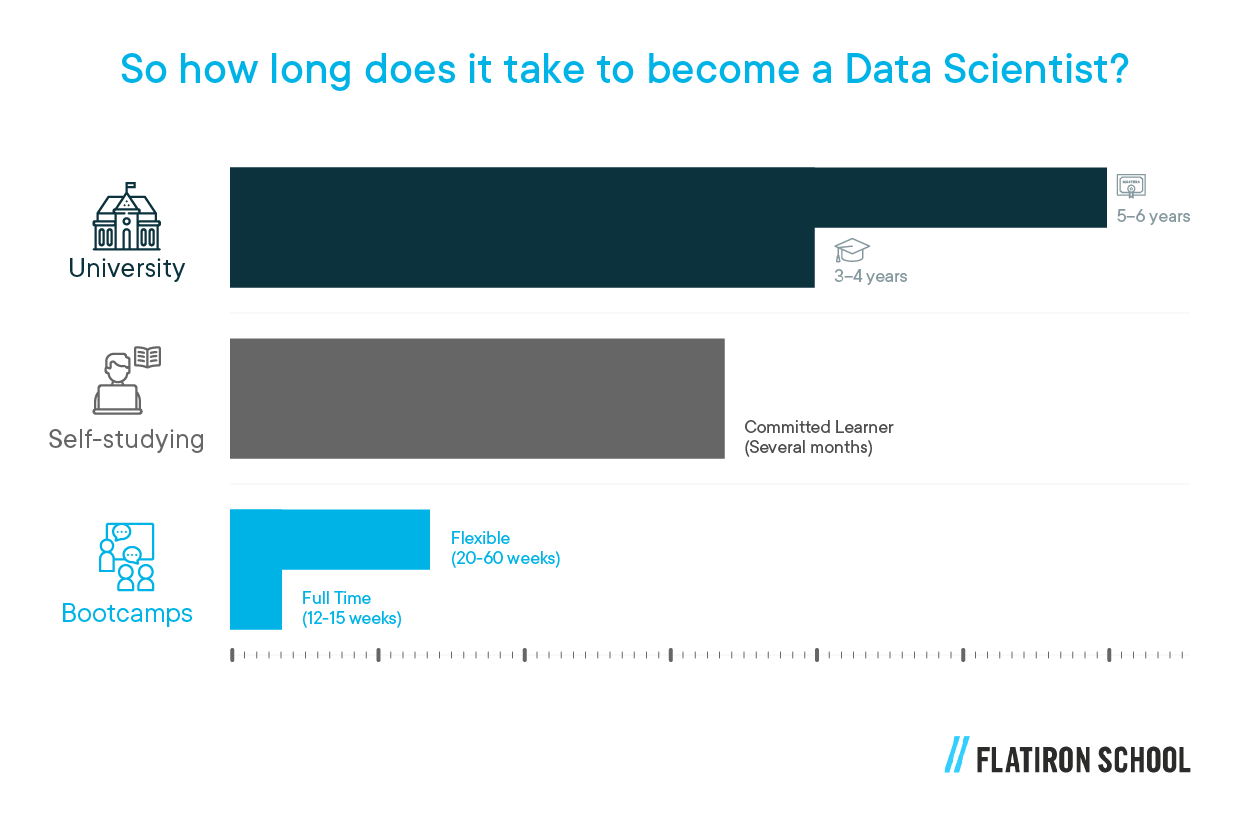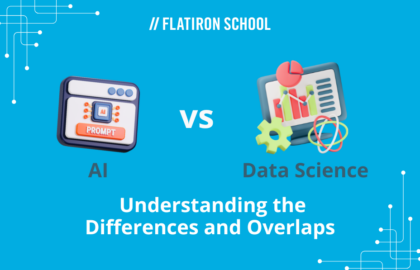Many people are familiar with Harvard Business Review’s 2012 article calling the data scientist profession “The Sexiest Job in America,” but some might wonder if the appeal has continued. The demand definitely continues — Glassdoor ranked data scientists in the top 3 on their list of “Best Job in America” for 5 years in a row.
This shouldn’t come as a surprise to anyone aware of data trends. The explosive growth in data-driven decision-making coupled with the emergence of low-cost and high-power computing has made the need for data scientists even greater than HBR predicted in 2012, leading to a shortage of data professionals.
Although the need for data scientists is great and the pay is quite high — the median data scientist starting salary is $114,528, according to Glassdoor. If you’re wondering, “How long will it take me to become a data scientist?” The answer is that it may not take as long as you think.
Let’s look at some information about this profession to answer the question, “How long does it take to become a data scientist?”

What Skills Do You Need To Become A Data Scientist?
Data scientists are a very diverse group of people, and their skill sets will vary from job to job. That said, there are some universal skills that every data scientist should master.
Coding
What is data science? It’s an interdisciplinary field that analyzes data to solve problems and inform business decisions.
The fundamental job of a data scientist is to take real-world inputs, use scientific methods, processes, algorithms, and computational systems, then extract knowledge and insights. The ability to develop machine learning and predictive models are some of the primary things that set data scientists apart from data analysts.
There are many data science programming languages that, and most data scientists will be proficient in a few. Some of the more popular programming tools include:
- Python: The most common coding language
- R: Used more for statistical analysis
- SQL: Otherwise known as search query language
- Java: For application building
- Matlab: For mathematical computation and modeling
- C/C++: For rapid and massive computation and ground-up app-building
Math
If a data scientist is going to find meaningful insights into their company’s struggles and opportunities, they need math skills. The latter is what it takes to convert real-world scenarios into solvable problems. Mathematics will play a critical role not only in posing answerable questions but in interpreting the results your algorithms give you.
You don’t need to be a math professor to be a data scientist. You just need some solid foundations in the following areas:
- Algebra: Setting up a problem so that it can be solved mathematically is step one in data science. Freshen up your algebra basics, and you’ll start on the right foot.
- Linear Algebra: Taking a step beyond foundational algebra, linear algebra deals mostly with matrices and vectors. You’ll need proficiency with matrix operations to do all that coding, so get comfortable with linear algebra.
- Calculus: Although most of your calculus computations can be done with software, you’ll still need to know about derivatives, integrals, and max’s and min’s to understand your results.
- Statistics and Probability: Data scientists eat, sleep, and breathe data. Interpreting that data is what statistics is. Given that part of a Data scientist’s job is to predict the future as accurately as possible with the information they have on hand, probability will play an essential role in calculating expected outcomes.
- Linear Regression: Somewhere between algebra and statistics, linear regression gives you a “best fit” approximation of a series of non-linear points. This is extremely helpful in predicting average values and probabilities and will help you crunch your data.
Business skills
Data analysts can number-crunch and IT professionals can code, but channeling technical skills to solve business problems is what sets data scientists apart.
To evaluate a business scenario and come up with a data model that gives actionable insights, a working knowledge of business intelligence (BI) is a skill every data scientist needs. Because of that, some data science curricula may include a few business or finance classes to give you a framework for how business is done.
Communication
Because a data scientist works with business professionals who know much less than them about coding and statistics, the ability to explain your ideas is essential.
From writing reports to giving presentations, a data scientist must be able to convey their insights in a way that non-technical professionals can understand them. This includes using data visualization tools like Tableau that make your data come to life. Whatever the method, be ready to communicate with those lacking a data science background.
Do You Need A Degree To Be A Data Scientist?
No, you don’t need a degree to become a Data Scientist. All you need are the skills needed to perform in the role.
While many data scientists currently have at least a master’s degree, 25% only have a bachelor’s degree, and some have no college degree at all. Companies are slowly learning that you may not need a degree in that specific field to excel as a Data Scientist. In fact, a growing number of companies are glad to accept Data scientists who have come from data science bootcamps.
How Can I Become A Data Scientist?
There are three main paths with different steps to become a data scientist.

Going to college
Pros of going to college to become a data scientist
- Formal training
- Most widely accepted
Cons of going to college to become a data scientist
- Longest time frame
- Most expensive
Many universities offer bachelor’s degrees in data science, but getting one takes an average of four years. And, depending on the college you choose, you could spend upwards of $99,000 for a four-year degree, where you can complete a data science bootcamp for less than $20,000.
Since most data science roles require a master’s degree or higher, though more education may be necessary. Some master’s programs can be completed online in as little as one year. And the longer you’re in school, the more you’ll have to pay — though financial assistance may be available.
Attending a data science bootcamp
Pros of attending a data science bootcamp
- Shorter journey
- Less expensive
- Valid skills gained
- Network and mentoring available
- Career coaching after graduation
Cons of attending a data science bootcamp
- Some employers might prefer a formal degree
With going to college being too lengthy and self-teaching not always being seen as legitimate, a middle path is often sought. Data science bootcamps provide just that. With intensive and job-specific training from industry-leading experts, students attending data science bootcamps gain immersive and hands-on experience in data science — without the unneeded courses required by universities.
This data-centric approach enables students to learn the information they need, while drastically reducing the length and cost of their journey. For example, Flatiron School offers full-time data science programs that you can complete in as little as 15 weeks, and you can complete their flexible pace option in 20, 40, or 60 weeks.
By the time they’re done, they have a series of networks to obtain a career and even career coaching support. The only downside is that some data managers prefer a formal degree.
Self-teaching
Pros of self-teaching data science
- Shortest path
- Ability to work at your own pace
- Most cost-effective
Cons of self-teaching data science
- Can take longer depending on your pace
- May not be accepted in some industries
- No structure or accountability
Many data analysts already have the mathematical, business, and communication skills it takes to become a data scientist — all they need to add is coding expertise. If you have enough prerequisites and some sort of degree — preferably in a STEM field — self-study and some certificates proving programming proficiency may be enough to enter the data science industry. Try a free lesson from Flatiron School to see if you’re ready to jump in.
Self-teaching may be the cheapest, but it requires enough discipline to keep yourself on task and is not for everyone. And it’s harder to prove what you know and how. It’s also important to make sure you’re learning the right material from legitimate sources, or you may find yourself less equipped than you thought — which is why some data science jobs may not view self-training as valid.
How Long Does It Take To Become A Data Scientist?

Because there are so many different paths to get there, the answer to “How long does it take to become a data scientist” is: it can vary.
Those who go the university route can become a data scientist in 3–4 years. For the 75% who decide to get their master’s in data science, it may take an additional 1–2 years.
The total time can be bumped up to 5–6 years. While self-studying has the potential to be the shortest path, this depends greatly on the student. Committed learners may complete their studies in months, while those who get distracted can lengthen their journey indefinitely.
Data science bootcamps can help students reach their goal of becoming a data scientist in just a few months. Some introductory bootcamps last for about six months — but most are about 12–15 weeks long. The bootcamp path may be the fastest option for some toward becoming a data scientist.
Ready To Get Started Today With Flatiron School?
If that sounds interesting to you, start your path to become a data scientist at Flatiron School today.
Flatiron School offers an immersive online program in data science that you can finish in as little as 15 weeks. Schedule a 10-minute chat with admissions to learn more.




